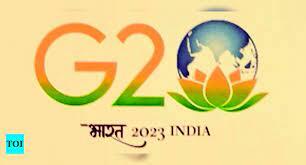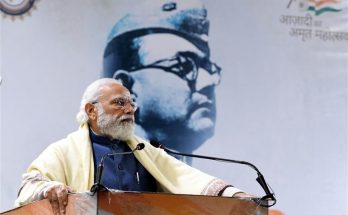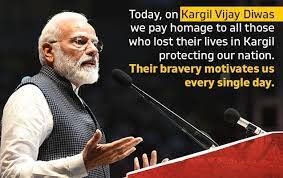
I am deeply honoured to be awarded the Seoul Peace Prize I believe that this award belongs not to me personally, but to the people of India. The award belongs to the success that India has achieved in the less than five years, powered by the strengths and skillsof one point three billion Indians. And so, on their behalf, I humbly accept the Award and express my gratitude. This award is a recognition of the philosophy that has given the message of वसुधैव कुटुम्बकम which means the entire world is one family. This award is for the culture that has given the message of peace even on the battle-field, as Lord Krishna gave the teachings of Bhagwad Gita during the battle in the महाभारत.This Award is for a land where we are taugh
ॐ द्यौ: शान्तिरन्तरिक्षं शान्ति, पृथ्वी शान्तिराप: शान्तिरोषधय: शान्ति:।
वनस्पतय: शान्तिर्विश्वे देवा: शान्तिर्ब्रह्म शान्ति,सर्वँ शान्ति:, शान्तिरेव शान्ति, सा मा शान्तिरेधि॥
ॐ शान्ति: शान्ति: शान्ति:॥
Which means:
May there be peace every where in the sky in space,all over our planet, in nature.
May there be eternal peace.
And, this award is for the people who have always put societal good above individual ambitions. And, I am honoured that this award is being conferred on me in the year that we celebrate the 150th Birth Anniversary of Mahatma Gandhi. I would like to contribute the Monetary award of Two Hundred Thousand dollars that one crore thirty lakh rupees to the नमामि गंगे Fund,our effort to clean a river that is not only held sacred by all the people of India, but is also an economic life-line to millions of my countrymen and women.
The Seoul Peace Prize was established to mark the success and spirit of the 24th Summer Olympics held in Seoul in 1988. India remembers the games quite well. Because they ended on Mahatma Gandhi’s birthday. The games showcased the best of Korean culture,the warmth of Korean hospitality, and the success of the Korean economy. And,not to forget, they marked the arrival of a new sporting power-house in the global arena! But,the games were also an important landmark in world history. The 1988 Olympics were held at a time of many changes in the world. The Iran-Iraq War had just ended. The Geneva Accords relating to the situation in Afghanistan had been signed earlier that year. The Cold War was ending, and there was great hope that a new golden age will soon Dawn. And for a while, it did. The world is better in many aspects today than it was in 1988 Global poverty has been steadily falling. Health-care and education outcomes have been improving. And yet, many daunting global challenges remain.Some are old, some new. A few months before the Seoul Olympics, the first public warnings about climate change were sounded.Today, it is recognized as a big threat to human-kind. A few weeks before the Seoul Olympics, an organization called Al-Qaeda was formed. Today, radicalization and terrorism have become globalized and are the biggest threats to global peace and security. And, millions of people around the world still remain without adequate and quality access to food, shelter,health-care, sanitation, power, and above all, dignity of life. Clearly, there is a lot more that needs to be done.The solution to the hard-ships we face is in hard work. And, India is doing her part. We have been working to improve the well being of the people of India – who form one-sixth of humanity. India is today the fastest growing large economy in the world with strong economic fundamentals. This has been possible because of the major economic changes that we have introduced. Flag-ship initiatives such as ‘Make in India’, ‘Skill India’, ‘Digital India’, ‘Clean India’ have contributed to visible socio-economic growth. We have focused on financial inclusion, access to credit, digital transactions, last mile connectivity, andsupport to small and medium enterprise so as to spread development across the country and enrich all the citizens of India. The Swachh Bharat Abhiyan is making India clean; From a sanitation coverage of around 38% in 2014, the number today stands at 98%! The Ujjwala Yojana is improving the lives of rural women through use of clean cooking fuel; Ayushman Bharat is providing health-care and insurance to 500 million poor and vulnerable people; and, Through these initiatives, and many more, we have contributed to holistic development and India’s march towards achievement of the United Nations Sustainable Development Goals. In all our efforts, we are guided by Mahatma Gandhi’s teaching that we should recall the face of the poorest and the weakest person that we have ever seen and ask ourselves if the step that we plan is going to be of any benefit to that person.
India’s growth story is not only good for the people of India but also for the entire world. We live in an increasingly connected world. As the third largest economy, our growth and prosperity will inevitably contribute to global growth and development. We are committed to make a peaceful, stable and economically inter-linked world. India, as a responsible member of the international community, has also been in the fore-front of our collective fight against climate change. Despite having a historically low carbon foot-print, India has been playing an active role in the global fight against climate change. At the domestic level, this has been done by unveiling a National Action Plan to reduce carbon emissions, increase forest cover, and replacing traditional carbon fuels with renewable energy supplies. On the international plane, we have partnered with like-minded countries to launch the International Solar Alliance, which aims to harness the clean and unlimited solar energy as an alternative to fossil fuels. We are one of the largest troop contributing countries for UN peace-keeping operations. And, we are proud to have been able to contribute to peace on the Korean peninsula. We have extended a helping hand to countries in need and participated actively in humanitarian work and disaster relief. We have carried out operations in conflict zones and rescued not only Indians but also nationals of many other countries. We have been an active and considerate development partner for other developing countries, with our guiding principle being to help in developing their physical and social infrastructure. Through these efforts, we seek to ensure that the benefits of a globalised and inter-connected world are equally experienced by all. Over the past few years, my Government has renewed interaction and forged new partnerships across continents. In the East Asian context, we have redefined our engagements with countries in the region, including with Republic of Korea, under our Act East Policy. I am glad to hear an echo of our approach in President Moon’s New Southern Policy.
India has been the land of peace for ages. The people of India have practiced the concept of peace and harmonious co-existence for thousands of years. With hundreds of languages and dialects, many states, and major religions, India is proud to be one of the most diverse nations in the world. We are proud that ours is a land where people of all faiths, beliefs, and communities can prosper. We are proud that ours is a society based not only on tolerance, but on celebration of differences and diverse cultures.
Like Korea, India has also suffered the pain of cross-border strife. Our endeavour towards peaceful development has only too often been de-railed by cross-border terrorism. While India has been the victim of cross-border terrorism for over 40 years, all nations today face this grave threat which respects no borders. The time has come for all those who believe in humanity to join hands to completely eradicate terrorist networks and their financing, supply channels, and to counter terrorist ideology and propaganda. Only by doing so can we replace hate with harmony; destruction with development; and, transform the landscape of violence and vendetta into a post-card for peace.
Progress over the past year towards peace on the Korean peninsula has been heartening. President Moon deserves all the praise for the role he has played in overcoming the legacy of mutual distrust and suspicion between the D.P.R.K. and the international community, and bringing them to the discussion table. This is no small achievement. I state again my Government’s strong support to the ongoing dialogue process between the two Koreas and between the U.S.A. and D.P.R.K.
I have every confidence that with continued efforts from the Korean people, peace will soon prevail on the Korean Peninsula. Friends, I would like to end by quoting a portion of the 1988 Olympics Theme Song, because it perfectly captures the hopeful spirit for a better tomorrow for all of us: Hand in hand, we standAll across the land,We can make this world,A better place in which to live.
Prime Minister Narendra Modi , acceptance Speech for the Seoul Peace Prize
Author Profile
- India Writes Network (www.indiawrites.org) is an emerging think tank and a media-publishing company focused on international affairs & the India Story. Centre for Global India Insights is the research arm of India Writes Network. To subscribe to India and the World, write to editor@indiawrites.org. A venture of TGII Media Private Limited, a leading media, publishing and consultancy company, IWN has carved a niche for balanced and exhaustive reporting and analysis of international affairs. Eminent personalities, politicians, diplomats, authors, strategy gurus and news-makers have contributed to India Writes Network, as also “India and the World,” a magazine focused on global affairs.
Latest entries
 In ConversationJuly 26, 2024India-Italy defence collaboration can extend to third countries: Anil Wadhwa
In ConversationJuly 26, 2024India-Italy defence collaboration can extend to third countries: Anil Wadhwa In ConversationJuly 23, 2024Italy views India as a key partner in Indo-Pacific: Vani Rao
In ConversationJuly 23, 2024Italy views India as a key partner in Indo-Pacific: Vani Rao DiplomacyJune 29, 2024First BRICS unveils a roadmap for boosting tourism among emerging economies
DiplomacyJune 29, 2024First BRICS unveils a roadmap for boosting tourism among emerging economies India and the WorldJune 11, 2024On Day 1, Jaishankar focuses on resolving standoff with China
India and the WorldJune 11, 2024On Day 1, Jaishankar focuses on resolving standoff with China






